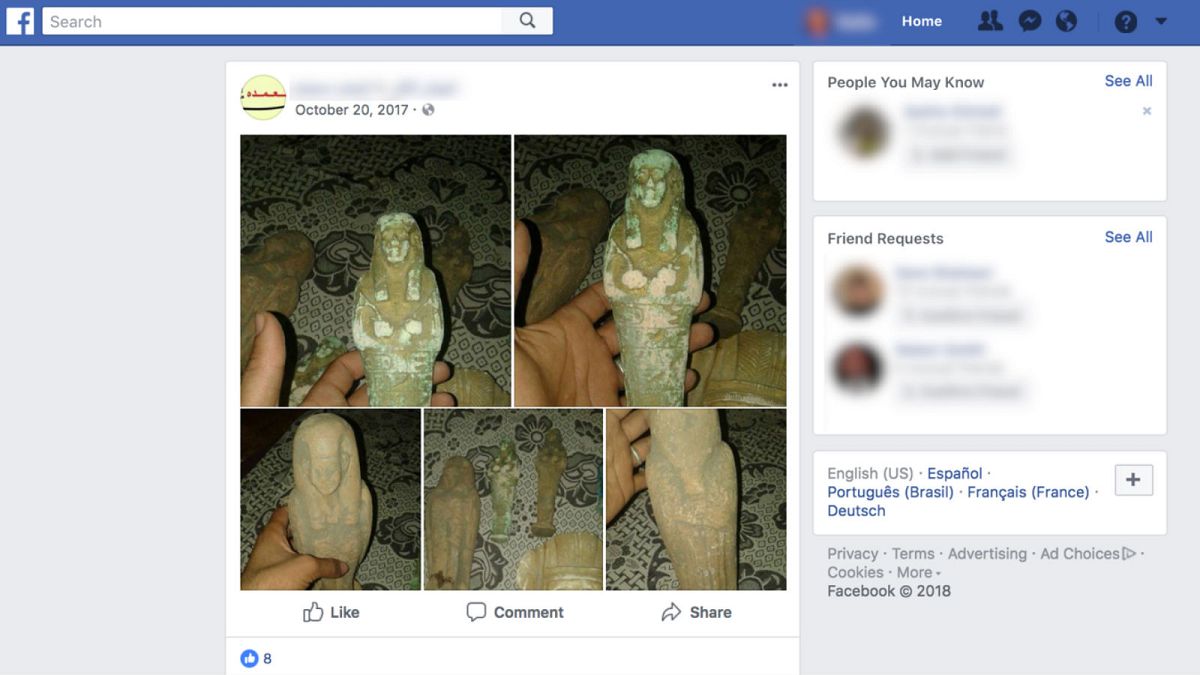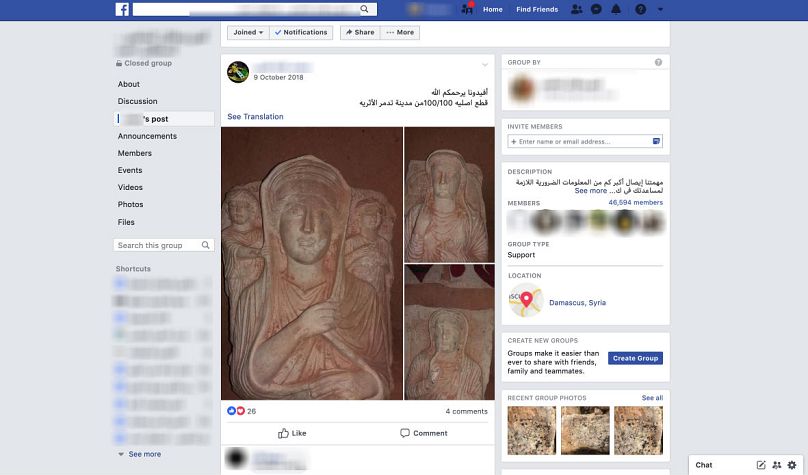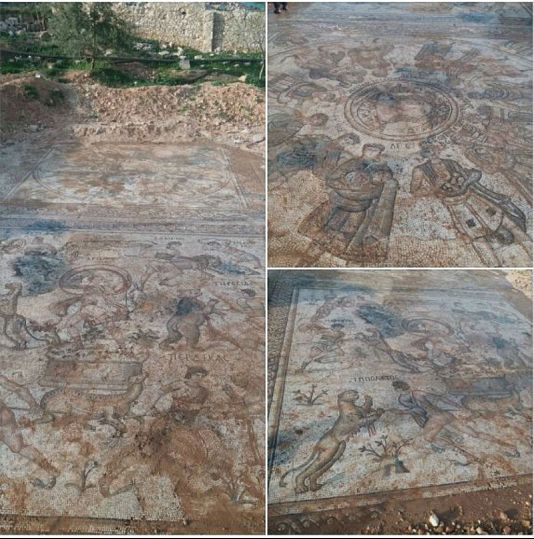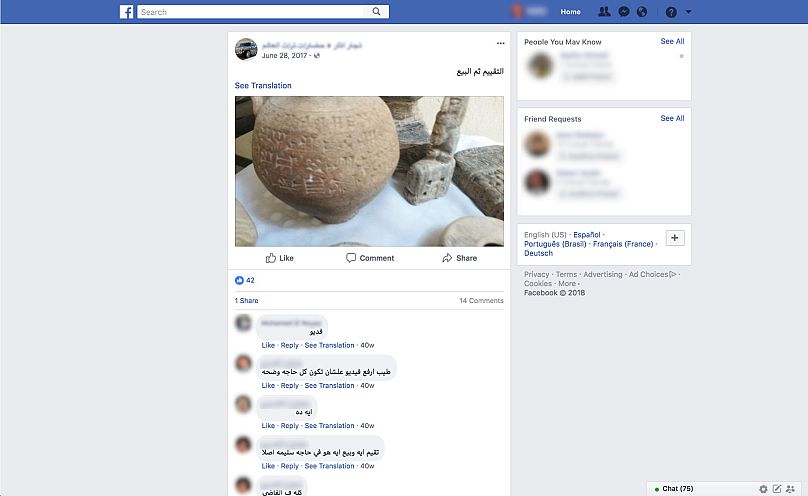"Social media was a very important driver of (the Arab Spring) protests so it was only a matter of time before the looting and trafficking of antiquities would bleed into social media," Dr Amr Al-Azm, Professor Middle East History and Anthropology, told Euronews.
Artefacts from Syria and other Middle Eastern countries are being looted and then sold on social media, with many ending up in Europe.
"In Iraq, Libya, Yemen ... looting has become really endemic and systematic," Dr Amr Al-Azm, Professor Middle East History and Anthropology at Shawnee State University, told Euronews.
He co-founded ATHAR (Antiquities Trafficking and Heritage Anthropology Research Project) with his colleague Katie Paul, and has spent years going through social media posts to investigate the digital underworld of transnational trafficking, terrorism financing, and organised crime.
The phenomenon started to emerge online as early as 2014 when people started to buy, sell and traffic items on the platforms.
It all started when Facebook pages popped up with people offering antiquities for sale, the professor said.
Everything from small items on the cheaper end of the market to large mosaics, statues, gold and silver coins and artefacts appeared online.
"Social media was a very important driver of protests so it was only a matter of time before looting and trafficking of antiquities would bleed in," he explained.
Looting became rife in Syria from around 2012 onwards due to the conflict that resulted from the Arab Spring, according to Al-Azm.
"Everything fell apart in the country and cultural heritage antiquities become a casualty of war," he said.
While pictures of fighting, shelling and images of radical extremist groups like the so-called Islamic State (IS) were commonplace, nobody was privy to the looting, which is the most extensive form of damage to cultural heritage in Syria, he added.
IS took looting to an "unprecedented level", the professor said, both institutionalising and intensifying the practice by creating a ministry charged with extracting resources to fund their activity — cultural heritage became a resource that they exploited like any other.
When people's livelihoods have been destroyed by war or famine they will find other ways to provide for themselves, he added, criminal elements also get involved because there is a market for it, including corrupt officials.
There is a wide range of people selling these artefacts, from professionals who loot and traffic to desperate people who are just trying to make ends meet, he said.
Some, use the online forums as a marketplace, while loot-to-order transactions are also commonplace, he added.
'Bulgaria has long been a hub'
Islamic artefacts often go to the Gulf region, but Europe too has an appetite for the antiquities.
There have recently been two large-scale busts in Spain, with objects from Egypt and Libya seized in Barcelona last year.
London and Paris are both major centres for the legitimate trade of antiques and "where you have this, you have on its fringes and even bigger illegal market," according to Al-Azm.
Bulgaria has long been a hub, not just for trafficking but also for manufacturing fakes, which is because it is the gateway to Europe from Turkey, the professor said.
"If you're going to move stuff into EU states, once you hit Bulgaria you open up your route," he explained.
While there is no legal market for antiquities in Turkey, it is a cornerstone in their trade, given its location, although Al-Azm said authorities were trying to clamp down on the issue.
Italy has a long-established history of buying looted antiquities, partly because of its own rich heritage, which means there is a well-established market, but also because of its geographical proximity to Africa, specifically Libya.
What can be done to stop the sale of antiquities online?
Social media has become part of the problem, said Al-Azm.
"They've allowed this problem to become so big now it's a game changer, when they could've done something about it when it first started," he added.
However, he does not want platforms to delete the posts or groups concerned, as they could be used as evidence to prosecute individuals who are trafficking.
"Our concern is they are going to rush out there and start deleting stuff because they are trying to cover themselves — that should've been done right at the beginning when we noticed it," he said.
Al-Azm claimed it's easy to find groups selling the antiquities, saying anyone could find numerous pages offering whatever they are interested in with just a few search terms, which then "opens up a whole world".
"Imagine Facebook, who are the owners and have the keys to the back doors and algorithms, they should've known about this and they never did anything about it until it became such a big problem," he said.
A Facebook spokesperson told Euronews that coordinating illegal activity was not allowed on its platform and that it had strict policies in place for removing content, profiles, pages or groups that break these rules when they are brought to its attention.
"We are continuing to invest in people and technology to keep this activity off Facebook and encourage others to report anything they suspect of violating our Community Standards so we can quickly take action," they added.
The platform encouraged users to report any such activity to local law enforcement.
Several organisations are working to uncover the online trafficking of antiquities, through both research and work on the ground.
In addition to ATHAR, ACCO (Alliance to Counter Crime Online) is a consortium of different organizations that are coordinating efforts to help track, monitor and advocate against the use of social media platforms for illicit activity, including antiquities trafficking.



